 Dinasha Edirisinghe was born in Sri Lanka and raised in Australia. She has completed a Bachelor of Arts and a Masters of Creative Writing, Publishing and Editing at The University of Melbourne and is currently completing her PhD at Deakin University. Her dissertation explores the creative work of the French feminist theorist Hélène Cixous and the Australian writer Patrick White. It also includes a novella called This Night which is inspired by her research. Her story, Vesāk, is an extract from this novella. Dinasha enjoys all things literary and loves living in Melbourne where she exposes herself to as much art, cinema and theatre as humanly possible.
Dinasha Edirisinghe was born in Sri Lanka and raised in Australia. She has completed a Bachelor of Arts and a Masters of Creative Writing, Publishing and Editing at The University of Melbourne and is currently completing her PhD at Deakin University. Her dissertation explores the creative work of the French feminist theorist Hélène Cixous and the Australian writer Patrick White. It also includes a novella called This Night which is inspired by her research. Her story, Vesāk, is an extract from this novella. Dinasha enjoys all things literary and loves living in Melbourne where she exposes herself to as much art, cinema and theatre as humanly possible.
Vesāk
The cold night deepens. It grows bold and the Moreton Bay Fig shivers, releasing a cascade of pebble-like fruit. Green buds like little moons descend, each one containing a universe within.
The Fig worries that he’s falling ill again. A chill runs through his leaves, the tips of his branches and his roots. Around him, the temple gardens are bathed in lights, each brilliant point a star in the dark sky. The moon, in full bloom, is its centrepiece: pearl white against a deep indigo sky.
The air echoes with an orchestra of voices chanting the five precepts: Kāmesumicchācāra veramaṇī sikkhāpadaṃ samādiyāmi. The voices, some too eager and others too slow, linger over the final word, carving its syllables into the earth.
Worshippers carrying food and offerings — flowers and parcels of milk rice and sweets wrapped in banana leaves — disperse along stone paths intersecting the gardens. A group of monks rugged up in orange and maroon admires a Crimson Bottlebrush, pointing at its red blooms, while a troupe of painted dancers rushes past, gesturing nervously to the stage up ahead, their thick coats rustling against their traditional garments. The line of Crepe Myrtles behind the stage flutters, excited. Their rusting foliage is set ablaze by the fairy lights adorning them.
The bell-shaped stupa to the left attracts the most interest. The burnt clay-brick structure, with its thick plaster casing, is a pure meringue-white. Visitors circumambulate, sit or prostrate themselves around it, deep in contemplation.
The Fig also makes a slight bow to the stupa. Bark, sap and heartwood creaking, he offers up the lanterns threaded throughout his branches. Their supple skins, lit from within, bounce and scratch against him.
A constellation of Buddhas watches as he moves.
Peppered throughout the gardens in a Centaurus-like pattern, they sit in various positions or mudras. Some are in the Dhyana Mudra, cross-legged with upturned palms placed one on top of the other, several sit in the Bhumisparsha Mudra, their right hands hanging over their knees and pointing towards the earth, their left hands sitting in their laps with the palm upturned. The reclining Buddhas lie on their sides and rest their hands against their cheeks, as if they are asleep, and the towering Buddhas, with giant stone lotuses blossoming at their feet, stand in the Abhaya Mudra: their right arms bent at the elbow and their palms facing outwards.
The Fig has seen each one of these monoliths raised over the years. Close to his height, they speak sometimes. Last year, they were the first to notice the rust forming on the undersides of his leaves. As the tiny yellow spots turned reddish brown, the monks grew alarmed, but the Buddhas did not panic. Instead, they insisted on staying up with him as he tossed and turned – feverish – telling stories to take his mind off his illness.
They told tales of stone quarries and a slow coming into consciousness. They reminisced about temperate climates and elaborate full moon festivities where whole countries were set alight for the occasion. The Fig is grateful to them. From time to time, he still dreams of elephant-led processions winding their way through streets glistening with spectators.
In the distance, the Fig spots a man and woman, wearing the traditional white, emerge from a line of worshippers waiting to pay their respects. They walk forward but disappear when a crowd of children hurtles past, engulfing them.
The man, jostled about, reaches out to the woman. His hand finds hers. Together they re-emerge from among the throng of youths heading in the opposite direction.
The Fig, prone to presentiment, knows that they are moving towards him.
He watches them veer off the stone path into his mass of protruding roots. Their hands loosen, then break apart as they step precariously from root to intertwined root, bodies pivoting, as if on an axis, each time they slip or stumble.
When they can go no further, they stop and stare upwards at the canopy of transpiring lanterns and leaves.
The lanterns reach out to Hema. They are refined and elegant and emit a gentle light that turns everything in the vicinity golden. They remind her of home, of walking hand in hand with her amma eating bombai mutai, which they buy from a vendor walking through the streets ringing a little bell. More straw-like than the fairy floss you can get here, Hema sorely misses its powdery texture.
Anthony feels the lanterns are goading him. He knows they are beautiful only because they are delicate and could be destroyed at any moment. To him, they are a reminder of the sensation of cool earth pressed against naked skin, the sound of a voice mimicking the call of the Magpie Robin and the last lines of a poem by Lakdasa Wikkramasinha: The poet is a bomb in the city, Unable to bear the circle of the Seconds in his heart, Waiting to burst.
Hema senses the shift in her husband. She is well versed in the signs. Despite this, she reaches out to touch him. He doesn’t notice. So, she withdraws the offending hand and covers it with the less-brazen one beside it.
A young man walking by throws a careless glance to his side and sees the two figures standing side by side: their faces frozen in attitudes of rapt attention. His mind transforms them into two masked players performing a tragedy to an amphitheatre of lanterns and leaves.
When the woman reaches out to the man standing beside her, the young man feels his own body tilt right in response – in anticipation. When she is rebuffed, the sting of indignity spreads throughout his own chest, pooling behind his eyes and at the pit of his stomach.
He perceives in her quick resignation something – once floriferous – withering. He has seen it before. Many times, in fact. She is like a flower – large and grotesque – decaying on its stem. Yet there is still something of life and of living in her predicament. Better to be like her than like himself: a bud wound tightly shut. Infructuous.
She is older than him, most likely part of that generation of migrants – some refugees but mostly skilled labourers – invited to come and settle here in Australia by the government. Unlike the first wave of Burghers that preceded them, they were not as adept at English or as knowledgeable about Western customs. But, through sheer determination, they made homes here, raised families, and put together what little they had to buy and bequeath this land to the monks. Now students, like him, hope to achieve the same, envying the fruits of their labours without really understanding the hardships that went into them.
The plot here, at the very outer limits of the burgeoning northern suburbs, is generous but the ground is sparsely populated with vegetation. There’s no humidity in this place, only a temperamental dryness. Even when it is cold, like it is today. The landscape is almost stripped down to the bone. The foliage an extension of its exoskeleton.
Back home, the young man studied history. Here this interest has been relegated to a past time while he studies for a Diploma in Information Technology. But in his free time, he does much reading on the country. To him, Australia seems a place pulled in different directions, echoing with forgotten voices. In this respect, it is like him. The outcast in an otherwise prosperous family, earning a kind of distinction by the act of leaving.
Now he spends his days studying, then scrubbing plates and pushing trolleys in a nursing home kitchen before coming home to a house he shares with three other male students.
He comforts himself with the knowledge that he did not come here out of some misguided fear of missing out. So many people did this, selling their shares in ancestral lands to pay for it. No, his was a self-imposed exile with a higher purpose. The way he left things, going back was not an option.
No doubt, in years to come, they will all wonder if they lost something instead of gaining it. He thinks the woman already wonders; he is sure of it.
Glancing at her, yet again, he cannot help but construct a life for them. It will begin on a quiet afternoon in spring. He will see her on the days she comes to help at the temple. One day she will drop her book and he will pick it up, running after her to return it. They will talk of their favourite novels, their shared interest in the works of Martin Wickramasinghe. She will find his penchant for rereading the historical texts of Walpola Rahula Thero deeply illustrative of his dedication to his true calling, a sign of his steadfast and disciplined nature. The ensuing months will be bliss, disrupted every now and then with the realities of conducting a secret affair. Eventually, she will leave her husband and come to him. There will be talk, of course, but it will not matter to them.
The young man sighs. It seems so easy for some, but not for him. He is reminded of his last foray into love, and it chastens him. Taking one last look at the woman, he continues on his way.
Hema, unaware of the interest she has provoked, is lost in thoughts of her duwa, Anu. In a little while Anu’s play will be performed on stage, a work of art she wrote all by herself. Each time the girl reads a book that moves her, she mopes around for days looking longingly out into a future that only she can see. It worries Hema, who knows that with each obsession Anu moves inwards, further away from how life really is.
Just like her thaththa.
Still, she has created something out of nothing, Hema admires this. Sometimes, the joy she feels when looking at her daughter is overtaken by sorrow, a deep, painful ache in her bones. Every now and then, for the briefest moment, there is envy. It crawls all over her skin, gnawing at it. Then there’s the fear and the uncertainty. It is the worst of all because it blinds her.
Hema shakes her head in an effort to forget.
When the world comes back into focus, a man steps into her line of vision. He is tall and his gait, his manner of movement, reminds her of an afternoon long ago. She’s sure she’s seen that silhouette before. She knows it. Though, it is dark, and maybe she is mistaken. She cannot be certain.
‘I think I know that man,’ Hema says out loud. She steps forward unconsciously and then feels suddenly afraid.
Anthony either doesn’t hear her or doesn’t care.
Up ahead, the man, as if responding, turns in her direction. He is not who she thought he was.
No matter, she thinks. Yet her heart beats hard and her body aches with the intensity of it.
It doesn’t matter. It doesn’t matter, she recites again, and again. There is a pain like electricity in her chest, spluttering and spitting, burning her up.
A little girl runs by the fig tree, catching Hema’s eye as she goes. She hops over the roots in leaps and bounds, fearless. Another girl runs close behind the first, a swirl of laughter and fabric. Dressed in crisp, white clothes: a simple dress, coat and stockings, the little girl squeals, stumbles, races ahead, falls and springs up in an instant, ready to go again.
A crimson ribbon comes undone in her hair. No longer bow-shaped, it dances in the air, contorting and twisting behind her.
Hema smiles. She thinks to herself that the ribbon flies wildly through the air the way little girls fly through their lives – free and unrestrained.
The girl glances back at the woman standing under the big tree with the pretty lanterns hanging off it. She seems to be staring at her. Leaving a streak of dirt on her cheek as she scratches at it, the girl notices the man beside the woman and her thoughts grow serious.
She wonders who she will marry one day. It seems so impossibly far away but wonderful all the same. The little girl’s seriousness dissipates as quickly as it comes. She hears her sister approaching and takes off again, in a hurry.
Hema watches her go.
Turning back to the fig, Hema finds it transformed. It now seems to sit in the ground like a fat spider with outstretched limbs. Its aerial roots dangling, web-like. The lanterns, too, are different. Superfluous, with their elaborate outer shells in the wrong for dulling the source of each lantern’s beauty: the naked light within.
The fig tree stares back at the woman. He stares hard, like she does, undaunted. In her he senses a kindred spirit.
She, like him, was moved here and made to grow in this soil. He bears deep scars from a great fire, but her blaze is still burning, her scars still forming. She, like him, only lets her flowers blossom deep within, life has taught her to do this. And, in the darkness, underneath her fruit-like armour of skin and bone, she is like him — full of wasps that sting but fill her with life as well. She is nothing without them.
She has come on this full moon day in the lunar month of Vesāka, to contemplate the life of the Gautama Buddha. Born a prince in Lumbini, he renounced everything and achieved enlightenment under the Bodhi tree before experiencing parinirvana and teaching us the lesson of impermanence. She, like him, takes solace in this knowledge, in this stepping away from desire, from the constant wanting. It makes the years lived and the hardships experienced seem small in comparison.
The fig has grown on this land for many years, and he has seen many things. As a sapling, he began life as an epiphyte; a newborn among ancients, who told tales of a native people – tens of thousands of years old – and great ships journeying across the ocean, spreading violence and disease.
As he grew into his surroundings, he saw land being cleared, friends being felled, and countless animals set to graze and die through intense periods of drought and fire. The worst blaze took place in 1851. It raised whole townships to the ground. And he, scattered in the wind, landed here alongside a Eucalypt, now a part of him, fully engulfed by his limbs. He, like her, is of this land and not of it at the same time. They are a million pieces, shifting, changing, converging endlessly.
Recently, he has begun to feel his age. The incessant creaking and swelling of his joints never cease and the endless pain in his limbs, worse since his illness, leaves his body bloated and stiff. But the sight of this woman, taking root in this old soil and growing, striving and struggling, makes him feel infinite, even if it is just for a moment.
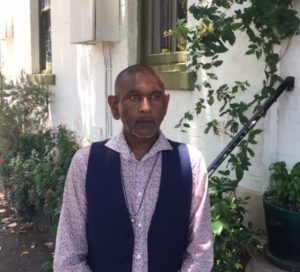 Christopher Cyrill is the author of the novels The Ganges and its Tributaries and Hymns for the Drowning. He has also published numerous stories, articles and written a number of broadcasted radio plays. For many years he was the fiction editor of HEAT and the fiction editor of Giramondo Publishing. Cyrill has taught at Sydney University and Macquarie University and currently runs his own writing academy mentoring writers.
Christopher Cyrill is the author of the novels The Ganges and its Tributaries and Hymns for the Drowning. He has also published numerous stories, articles and written a number of broadcasted radio plays. For many years he was the fiction editor of HEAT and the fiction editor of Giramondo Publishing. Cyrill has taught at Sydney University and Macquarie University and currently runs his own writing academy mentoring writers.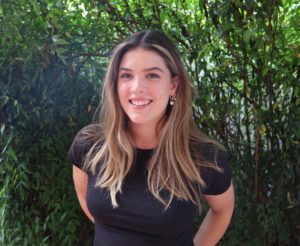 Morgaine Riley is a writer and English tutor from Peramangk Country (the Adelaide Hills). In 2021, she was awarded the Peter Davies Memorial Prize for Creative Writing. She has recently completed an Honours in Creative Writing at the University of Adelaide.
Morgaine Riley is a writer and English tutor from Peramangk Country (the Adelaide Hills). In 2021, she was awarded the Peter Davies Memorial Prize for Creative Writing. She has recently completed an Honours in Creative Writing at the University of Adelaide. AJ DeMoyer is an emerging writer of eco-dystopian short fiction, currently studying an MA Writing and Literature at Deakin University. April lives with her husband, two tiny dogs and an oversize cat on Dharawal Country (regional NSW). When she’s not studying, reading or writing, she’s either propagating succulents in her garden, obsessively sorting
AJ DeMoyer is an emerging writer of eco-dystopian short fiction, currently studying an MA Writing and Literature at Deakin University. April lives with her husband, two tiny dogs and an oversize cat on Dharawal Country (regional NSW). When she’s not studying, reading or writing, she’s either propagating succulents in her garden, obsessively sorting 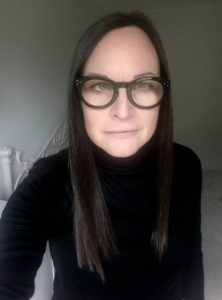 Juanita is an emerging writer who lives in a small town in rural Victoria, on the unceded land of the Dja Dja Wurrung people. She has only recently tapped into a deep desire to write. Having successfully navigated away from a long career as a professional photographer, Juanita is now completing her arts degree in anthropology and creative writing at Deakin University in Geelong.
Juanita is an emerging writer who lives in a small town in rural Victoria, on the unceded land of the Dja Dja Wurrung people. She has only recently tapped into a deep desire to write. Having successfully navigated away from a long career as a professional photographer, Juanita is now completing her arts degree in anthropology and creative writing at Deakin University in Geelong.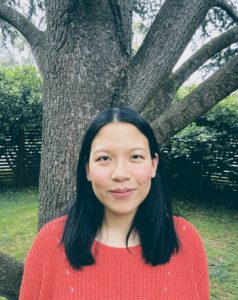 Megan Cheong is a teacher, writer and critic living and working on Wurundjeri land. Her writing has been published in
Megan Cheong is a teacher, writer and critic living and working on Wurundjeri land. Her writing has been published in  Dinasha Edirisinghe was born in Sri Lanka and raised in Australia. She has completed a Bachelor of Arts and a Masters of Creative Writing, Publishing and Editing at The University of Melbourne and is currently completing her PhD at Deakin University. Her dissertation explores the creative work of the French feminist theorist Hélène Cixous and the Australian writer Patrick White. It also includes a novella called
Dinasha Edirisinghe was born in Sri Lanka and raised in Australia. She has completed a Bachelor of Arts and a Masters of Creative Writing, Publishing and Editing at The University of Melbourne and is currently completing her PhD at Deakin University. Her dissertation explores the creative work of the French feminist theorist Hélène Cixous and the Australian writer Patrick White. It also includes a novella called 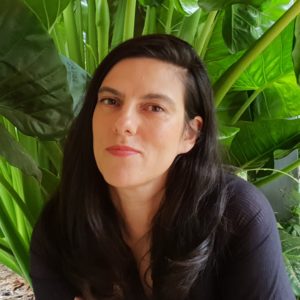
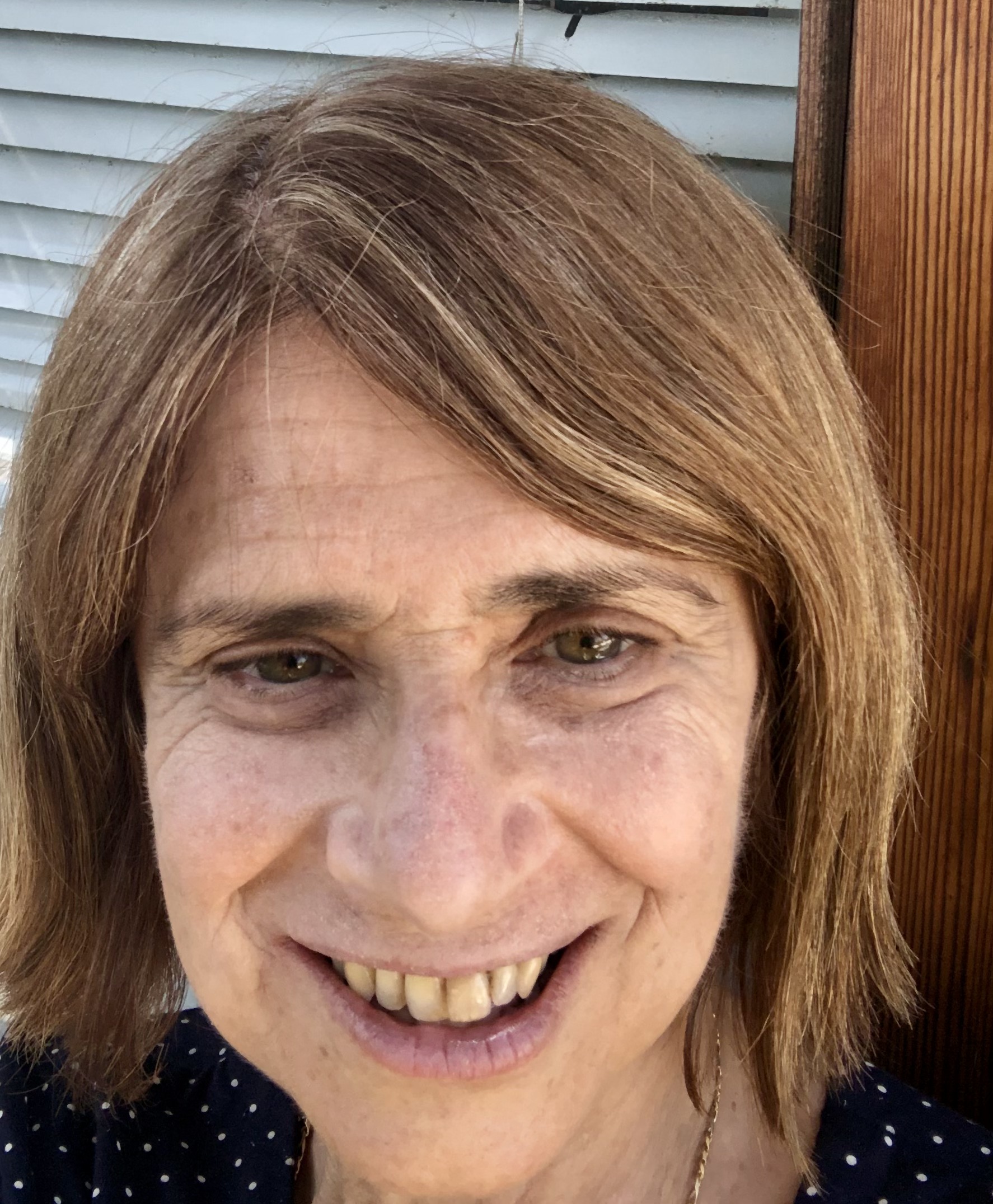 Zoe Karpin lives in Sydney’s inner west with her partner and dog and also works as a Learning and support teacher at a south west multicultural Sydney High School. She has had short stories published in journals such as Going Down Swinging, Gathering Force, Hecate & Femzine recently and online journals such as Dotlit and Sūdō journal recently.
Zoe Karpin lives in Sydney’s inner west with her partner and dog and also works as a Learning and support teacher at a south west multicultural Sydney High School. She has had short stories published in journals such as Going Down Swinging, Gathering Force, Hecate & Femzine recently and online journals such as Dotlit and Sūdō journal recently.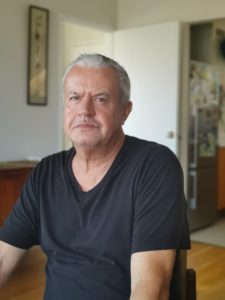 Peter Gilkes is a writer, artist and previously an operations and business manager based in Kuala Lumpur. He recently returned to Australia after working in SE Asia for nine years. He has had articles published with the Sydney Morning Herald and is now compiling a book of images and memories of travel from the last 30 years.
Peter Gilkes is a writer, artist and previously an operations and business manager based in Kuala Lumpur. He recently returned to Australia after working in SE Asia for nine years. He has had articles published with the Sydney Morning Herald and is now compiling a book of images and memories of travel from the last 30 years.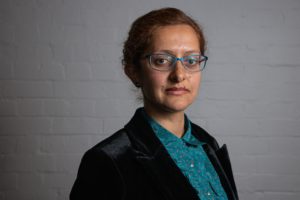 Yumna Kassab is a writer from Western Sydney. She studied medical science and neuroscience at university. Her first book of short stories, The House of Youssef, has been listed for prizes including the Victorian Premier’s Literary Award, Queensland Literary Award and The Stella Prize. Her writing can be found online at Kill Your Darlings, Sydney Review of Books, Peril Magazine, Meanjin, The Sydney Morning Herald and now Mascara Literary Review.
Yumna Kassab is a writer from Western Sydney. She studied medical science and neuroscience at university. Her first book of short stories, The House of Youssef, has been listed for prizes including the Victorian Premier’s Literary Award, Queensland Literary Award and The Stella Prize. Her writing can be found online at Kill Your Darlings, Sydney Review of Books, Peril Magazine, Meanjin, The Sydney Morning Herald and now Mascara Literary Review.